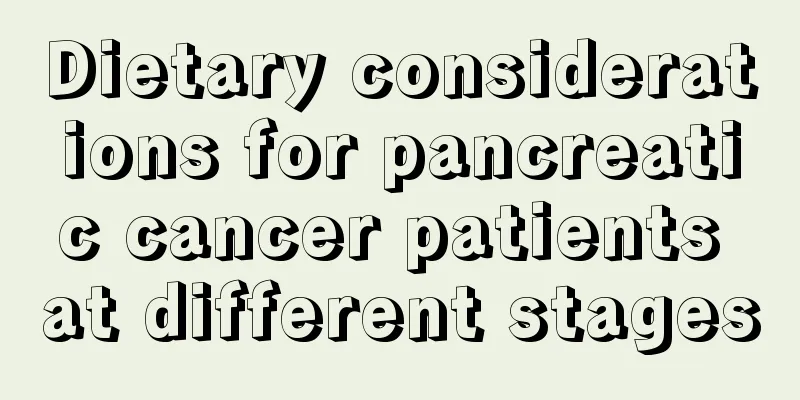Dietary considerations for pancreatic cancer patients at different stages

|
Pancreatic cancer is a dangerous malignant tumor. The annual incidence rate of pancreatic cancer in my country is 5.1/100,000. The incidence rate of pancreatic cancer in men in Shanghai is close to that in Europe and the United States. The prognosis of pancreatic cancer is poor. In order to maximize the patient's quality of life, patients need to pay special attention to their daily diet during recuperation to avoid increasing the burden on the pancreas. Early The symptoms of early pancreatic cancer patients are relatively mild, mainly digestive discomfort, such as nausea, poor appetite, aversion to oil, and steatorrhea. When eating a high-fat and high-protein diet or overeating, the pancreas is damaged and the symptoms of digestive disorders are aggravated. Therefore, patients should have regular meals, at regular times and quantitative amounts, and eat small meals frequently, 3 to 5 meals a day, otherwise it may cause the pancreas to continuously secrete pancreatic juice, increasing the burden on pancreatic function. The diet should be reasonably matched, and attention should be paid to the ratio of carbohydrates, fats and proteins. Carbohydrates should be the main food, and the amount of fat and protein should be appropriate. Proteins that are easy to digest and absorb should be consumed, such as lean meat, eggs and fish. Reasonable cooking methods should be used, such as boiling, stewing, simmering, steaming, and sautéing. Do not use frying, deep-frying, or stir-frying, so as to avoid excessive secretion of pancreatic juice due to excessive oil in the food. Middle and late stage When the disease develops to the middle and late stages, the patient's upper left abdominal pain worsens, and there is obvious weight loss and ascites. It is very difficult for the patient to eat orally, and it cannot meet the body's needs. At this time, intravenous nutrition is needed to improve the overall nutritional status. Patients who have not lost the opportunity for surgery should try to take active measures to remove the lesion through surgery. After the operation, the patient must not eat or drink for three days, and the body's physiological needs must be maintained through peripheral and central venous nutrition. After the gas is exhausted, the patient can eat some oil-free full-liquid food such as rice soup, fruit juice or vegetable juice to stimulate the digestive function of the gastrointestinal tract. After the gastrointestinal tract gradually adapts, the patient can gradually change to low-fat semi-liquid or low-fat food according to his appetite. |
<<: Health food therapy for lymphoma patients during chemotherapy
>>: Traditional Chinese medicine prescription to relieve the pain of gallbladder cancer
Recommend
What are the symptoms of brain metastasis from ovarian cancer
Generally speaking, if ovarian cancer metastasize...
Prevention of cardia cancer should start from daily life
Cardiac cancer is a tumor with a high incidence r...
How to use eyebrow growth liquid
Many friends want to make their eyebrows bigger a...
What are the traditional Chinese medicines for treating ovarian cancer? These 4 traditional Chinese medicines can treat ovarian cancer
There are many traditional Chinese medicines for ...
Ovarian cancer usually causes symptoms such as waist and abdominal pain
Ovarian cancer usually causes pain in the waist a...
What are the symptoms of lung cancer invasion and metastasis? There are six major symptoms of lung cancer invasion and metastasis
Most people only know the symptoms of lung cancer...
How is kidney cancer classified
In recent years, kidney cancer has become one of ...
Is esophageal cancer contagious through saliva?
Some people believe that esophageal cancer is a c...
Do you know what causes brain cancer?
Brain cancer is a disease that mainly manifests i...
How can I wash off the oil stains on clothes
Many times, housewives find it very difficult to ...
Average life expectancy of women with thyroid cancer
After women are diagnosed with thyroid cancer, th...
Tips for treating itchy scalp
There are many tips for treating itchy scalp. Som...
Gastric cancer may also present with upper abdominal pain
Gastric cancer may also cause upper abdominal pai...
What are the items in liver function test? How often should liver function test be performed?
Liver function test is an important screening met...
The difference between bone and tooth
Some people may have the problem of protruding mo...









